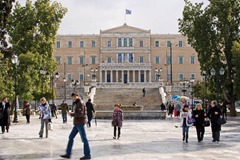Greece takes on presidency
 Greece has assumed the Presidency of the Council of the European Union, almost four years into its bail-out programme. Strict austerity was imposed after the decision to lend €146 billion in May 2010. It aims to leave the bail-out in 2014.
Greece has assumed the Presidency of the Council of the European Union, almost four years into its bail-out programme. Strict austerity was imposed after the decision to lend €146 billion in May 2010. It aims to leave the bail-out in 2014.
The presidency rotates among member states every six months and will pass to Italy in July. It involves chairing meetings of ministers although the most strategic decisions are taken by heads of government in the European Council. The rota for presidencies was decided in 2007, well before the euro zone crisis.
The Greek Government has set out four “fields of action” for January-June 2014: growth, jobs and cohesion; further integration of the EU and euro zone; migration, borders and mobility; and maritime policy.
On the first point, Greece wants to increase the lending capacity of the European Investment Bank for labour-intensive projects and small businesses. It warns of the risks of “jobless growth” at a time when around half of young Greeks are unemployed.
The Government’s preference is a “deep and genuine” economic and monetary union in the 18-member euro zone which keeps the single market open to the 10 non-euro members.
In migration policy, it wants to see a common European asylum system, tougher border protection and more action (at source) to prevent illegal immigration. Greece supports the Commission’s efforts to promote ‘blue growth’ in coastal areas and wants to finalise a maritime security strategy.





